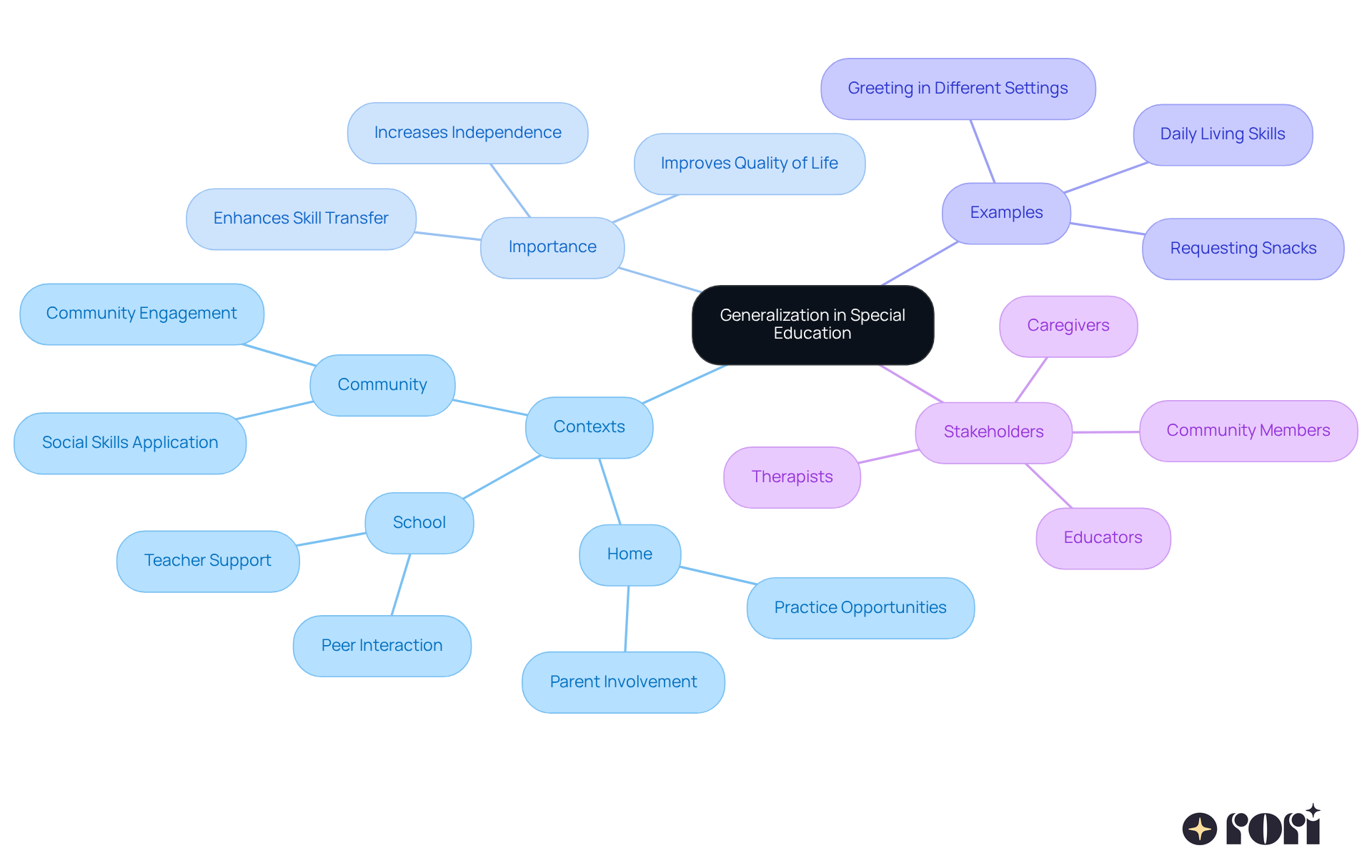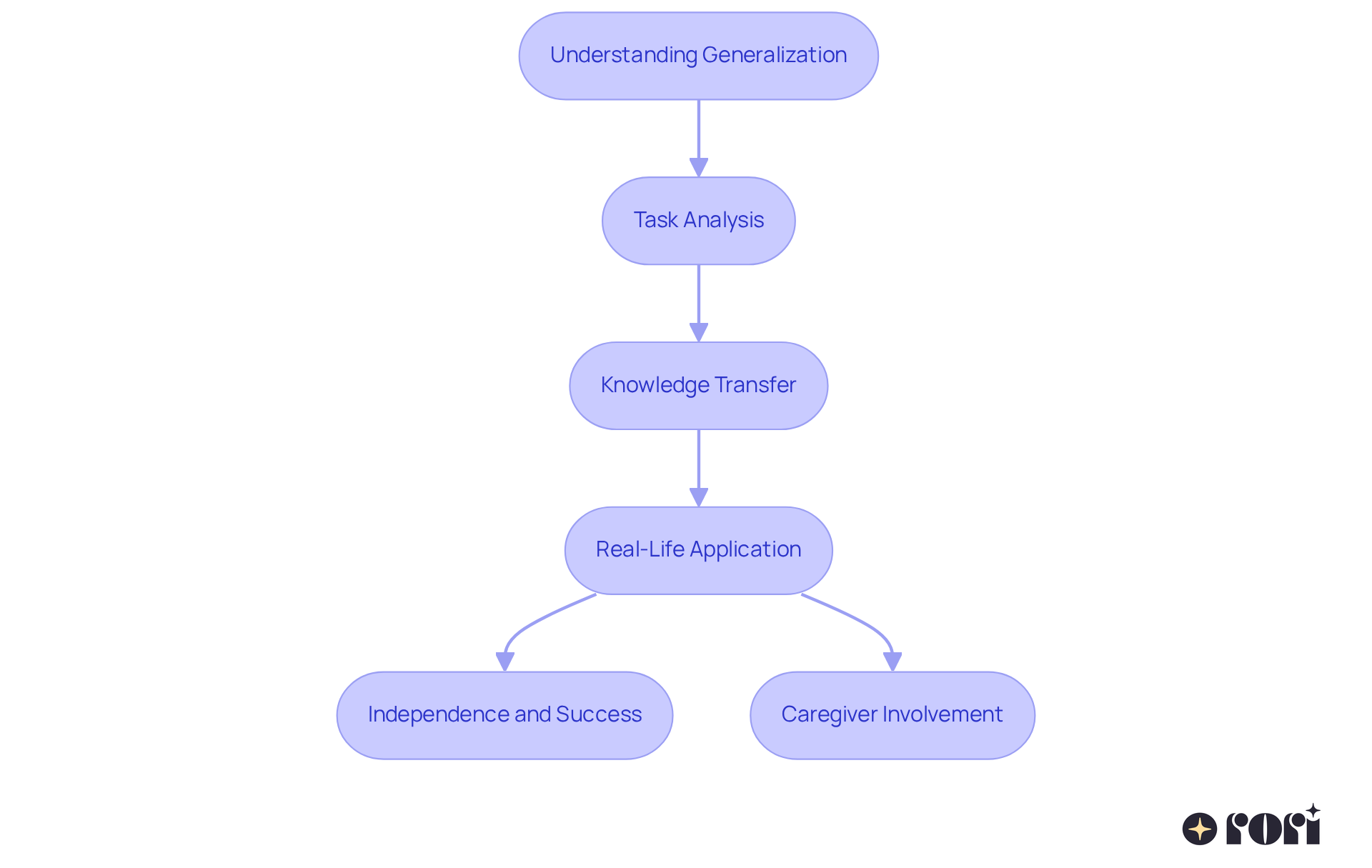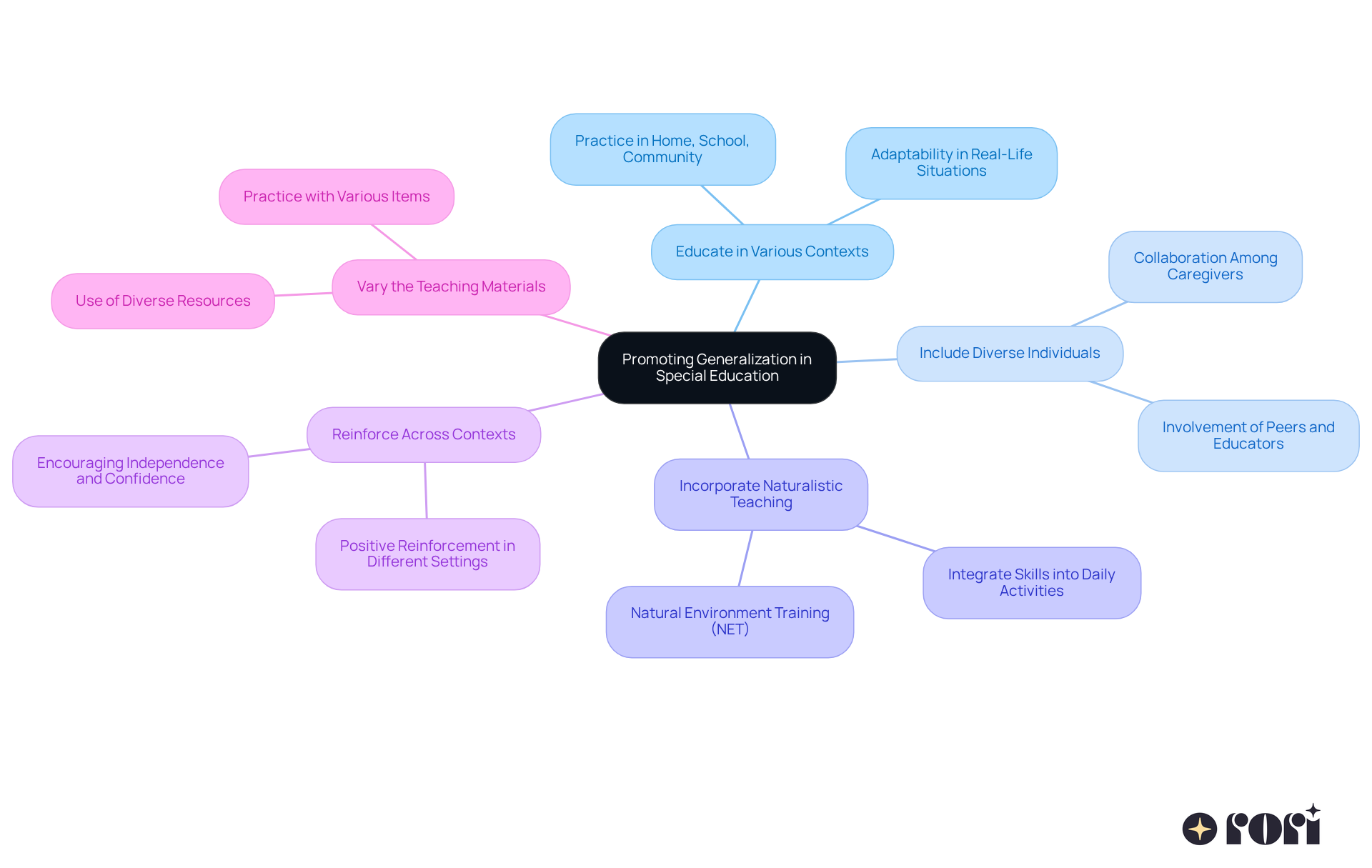Generalization in special education is all about helping learners apply skills or behaviors they've picked up in one situation to different ones, and with various people. This ability is super important for fostering independence and adaptability in real-world scenarios. Research shows that when learners practice their skills in diverse settings, they're more likely to use those skills outside of therapy sessions. This not only enhances their quality of life but also boosts their social interactions.
Let’s think about it: imagine a child who learns to communicate their needs in a therapy room. If they can use that same skill at home or in the community, it makes a huge difference! By encouraging practice in different environments, we can help our kids thrive. So, if you’re a parent navigating this journey, remember that every little bit of practice counts. We’re here to help you every step of the way!
Understanding the concept of generalization in special education is so important for helping learners with special needs become more independent and adaptable. This key principle allows individuals to take the skills they learn in one setting and apply them to various real-life situations, making it easier for them to navigate social interactions and daily tasks.
But here’s the question: how can educators and caregivers effectively help these skills transfer beyond the classroom? 🤔 Exploring the nuances of generalization not only highlights its significance but also uncovers practical strategies to empower children on their learning journeys. Let’s explore this together!
When we discuss what is generalization in special education, we are referring to a learner's ability to take skills or behaviors learned in one situation and apply them in different contexts, with different people. Understanding what is generalization in special education is crucial for ensuring that the skills acquired during therapy or teaching extend beyond the specific environment where they were learned. For example, if a child learns to greet their therapist, we want them to also greet family members, friends, or teachers in various places, like home or school. This transfer of skills not only boosts the child's independence but also helps them adapt to real-world situations.
Now, why is expanding these concepts so important? Without it, skills can remain stuck in the therapy room, limiting their practical use. Research shows that effective techniques related to what is generalization in special education can significantly improve outcomes for kids with autism and learning disabilities. For instance, studies indicate that children who practice skills in different settings—like therapy rooms, homes, and schools—are more likely to use those skills in their everyday lives.
Additionally, statistics highlight that what is generalization in special education is a key goal for behavior analysts working with individuals with special needs, as it increases the likelihood of completing tasks independently. It's essential to engage caregivers and community members in the educational process, as their involvement reinforces skills across different contexts, ultimately enhancing the child's ability to navigate various social situations. By focusing on generalization, educators and therapists can ensure that the skills learned are practical and relevant, leading to greater independence and an improved quality of life for individuals with autism. Let’s explore this together!

What is generalization in special education is super important! It really boosts the chances that learners will use their skills in different situations. If they can’t grasp what is generalization in special education, their abilities might just stay in the classroom, making it tough for them to be independent in everyday life. Imagine a young person who learns to ask for help in school but struggles to do the same at a grocery store or at home. That’s where the concept of what is generalization in special education comes in!
Research shows that task analysis, a technique used in ABA therapy, not only helps with learning but also supports better knowledge transfer and independence for youth with autism. By encouraging broader thinking, educators and therapists help young individuals learn what is generalization in special education, which aids them in developing the flexibility needed to navigate various social situations. This approach can significantly enhance their quality of life. For example, one parent shared that their child reached several milestones in just three months of therapy, highlighting how effective broadening techniques can be in real-life settings.
These results underscore the importance of integrating broadening techniques into educational practices. It’s all about ensuring that our young learners have the skills they need for greater independence and success in their daily lives. Plus, when caregivers understand ABA principles and strategies, they’re better equipped to support their child’s learning at home. This active involvement not only improves behavioral outcomes but also boosts caregivers' confidence and reduces stress—essential for creating a nurturing environment for children’s growth.
So, let’s explore this together! If you’re a parent looking for ways to support your child’s learning journey, remember you’re not alone. We’re here to help you every step of the way!

Key characteristics of generalization in special education include:
Stimulus Generalization: This happens when a learner takes a skill learned in one situation and applies it to similar but different situations. For example, a young person who knows to say 'thank you' when given a gift might also use this expression when receiving help from a teacher. This shows their ability to use learned behavior in various scenarios.
Response Generalization: This is when the learner uses different ways to achieve the same result. For instance, a young person may learn to ask for a toy verbally but can also use a picture card to make the same request. This flexibility in communication is key for effective interaction in different environments.
Maintenance: This refers to the ability to keep using learned skills over time, even after instruction has ended. For example, a young person who learns to tie their shoes should be able to do it independently weeks or months later, showing they’ve retained that skill.
These traits are vital for ensuring that skills are not only learned but also effectively used in real-life situations, ultimately helping children with autism gain more independence and confidence.
Parents and caregivers play a crucial role in promoting what is generalization in special education by creating opportunities for practice outside of therapy sessions. By understanding and using ABA principles, caregivers can enhance their support at home, which relates to what is generalization in special education, ensuring that learned skills carry over into daily life. This active involvement not only boosts the individual's ability to handle daily tasks and social interactions but also empowers caregivers through informed decision-making and strategy alignment.
Social skills group therapy can also enhance this transfer by providing a structured environment where children can practice their skills with peers, reinforcing their learning in a social setting.
However, there are challenges in encouraging broad application, such as identifying potential contexts for skill use and ensuring consistent intervention across different settings. Strategies like varying teaching environments and involving multiple instructors can significantly improve the transfer process. Plus, using technology for immediate feedback can make ABA therapy even more effective, helping to integrate learned skills into everyday routines.
Let’s explore this together! We’re here to help you every step of the way!

To effectively promote generalization in special education, several strategies can be employed:
Educate in Various Contexts: Practicing abilities in different environments—like home, school, and community—helps kids apply their skills more broadly. Studies show that when kids learn in various settings, they become more adaptable and can use what they've learned in real-life situations.
Include Diverse Individuals: Involving different educators, such as parents, teachers, and peers, supports kids in applying their skills in various social situations. Collaboration among caregivers and educators is key to keeping things consistent and reinforcing learned behaviors across multiple environments.
Incorporate Naturalistic Teaching: Integrating skills into daily activities, like practicing conversation techniques during playtime, significantly boosts the chances that kids will use these skills in real-world situations. Natural Environment Training (NET) promotes learning in familiar settings, making the skills more relevant and applicable.
Reinforce Across Contexts: Offering positive reinforcement when kids apply their skills in different environments encourages them to generalize their knowledge. For instance, praising a child for using polite language with a family member strengthens that behavior in various contexts, fostering their independence and confidence.
Vary the Teaching Materials: Using a mix of resources and approaches during instruction helps kids adapt their skills to different situations. For example, if a child learns to count using blocks, they should also practice counting with various items, like toys or snacks, to reinforce their understanding and usage of the skill.
By implementing these strategies, educators and parents can significantly enhance what is generalization in special education, thereby fostering greater independence and social participation in children with special needs. Let’s explore this together and see how we can support our kids every step of the way!

Understanding generalization in special education is so important for helping our learners with special needs become more independent and adaptable. This idea really highlights how crucial it is to transfer skills learned in specific situations to everyday life, so children can navigate their world with confidence. By focusing on generalization, educators and caregivers can make a big difference in how these skills are applied, leading to a better quality of life for individuals with autism and other learning disabilities.
The article sheds light on some key aspects of generalization, like its definition and importance, as well as characteristics such as stimulus generalization, response generalization, and maintenance. It also shares strategies for promoting generalization, such as:
These strategies are essential for ensuring that skills are not just learned but also retained and applied across different settings, helping children engage more fully with their surroundings.
In conclusion, we can’t underestimate the importance of generalization in special education. It plays a vital role in fostering independence, enhancing social interactions, and improving outcomes for children with special needs. By actively engaging in practices that support generalization, we can empower our learners to thrive in various environments, paving the way for a more fulfilling and autonomous life. Remember, the journey toward effective generalization is a team effort, and together, we can create a nurturing framework that supports growth and success. Let’s explore this together!
What is generalization in special education?
Generalization in special education refers to a learner's ability to apply skills or behaviors learned in one situation to different contexts and with different people.
Why is generalization important in special education?
Generalization is crucial because it ensures that skills acquired during therapy or teaching extend beyond the specific environment where they were learned, allowing for greater independence and adaptability in real-world situations.
How does generalization benefit children with autism and learning disabilities?
Research shows that effective techniques related to generalization can significantly improve outcomes for children with autism and learning disabilities by increasing the likelihood that they will use learned skills in their everyday lives.
What role do different settings play in the generalization of skills?
Practicing skills in various settings—such as therapy rooms, homes, and schools—enhances the likelihood that children will use those skills in real-life situations.
How can caregivers and community members contribute to the process of generalization?
Engaging caregivers and community members in the educational process helps reinforce skills across different contexts, ultimately enhancing the child's ability to navigate various social situations.
What is the ultimate goal of focusing on generalization in special education?
The goal is to ensure that the skills learned are practical and relevant, leading to greater independence and an improved quality of life for individuals with autism.